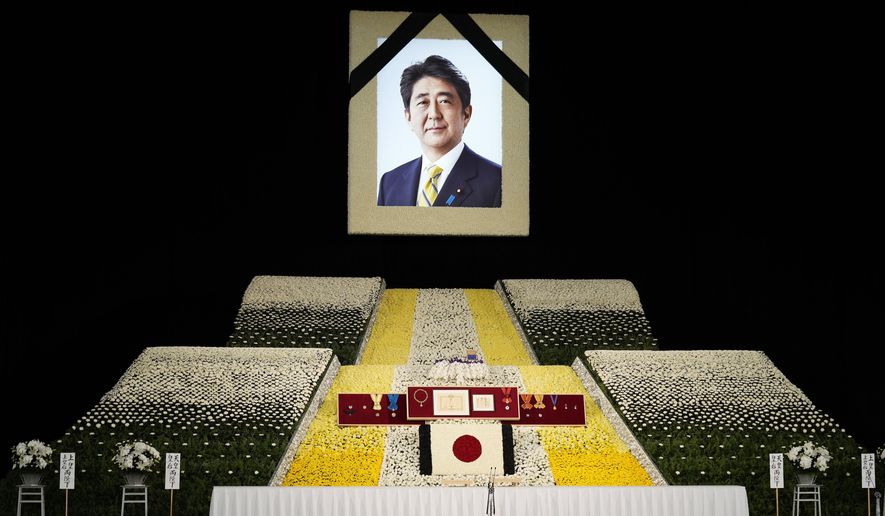OPINION:
The assassination of former Prime Minister Shinzo Abe on July 8, by a tragically deranged 41-year-old man has unleashed forces that caused me to take a new look at how Japan is evolving.
The assassination of Mr. Abe was apparently the act of a single mentally ill individual. However, the demons that have been unleashed since then into the Japanese political system were the result of a long buildup of anti-Abe sentiment. It was as though the spell Prime Minister Abe had cast over Japan from 2006 to 2020 was suddenly shattered.
The forces of communism, anti-religious hostility, and anti-American resentment, all came pouring into the public square in a deeply emotional effort to destroy Mr. Abe’s memory – and with it the forces of anti-communist, pro-freedom, and pro-American sentiment that Mr. Abe had so powerfully and effectively represented.
Prime Minister Abe was the longest-serving Prime Minister in Japanese history. He led Japan in 2006 and 2007 and again from 2012 to 2020. He was a dynamic leader. Like Margaret Thatcher in Great Britain, Benjamin Netanyahu in Israel, and Ronald Reagan and Donald Trump in the United States, Abe’s dedication to a strongly nationalist policy – and strong defense – was deeply opposed by a significant part of Japanese society. If Ms. Thatcher stood for Britain first, Mr. Netanyahu stood for Israel first, and Mr. Reagan and Mr. Trump stood for America first, Mr. Abe stood for Japan first.
Mr. Abe was particularly marked by his commitment to remain close to the United States and to work with other nations to contain an increasingly powerful and assertive Communist China. Mr. Abe understood that Japan by itself could not survive as an independent country if it had to cope with China alone. The sheer size of China in population and economic growth required a coalition-alliance approach to contain it.
At the same time, Mr. Abe realized that the United States was the key to Japan’s survival as an independent nation. Part of his affection for America came from his own personal expertise growing up. As he explained to a Joint Session of Congress on April 29, 2015, his first experience with America occurred when he went to California as a student. A woman had kindly opened her home to him so that he could go to school in America. The woman was a good cook and people would always stop by her house to visit. The young Mr. Abe was moved by this community interaction.
As he told Congress: “They were so diverse. I was amazed and said to myself, ‘America is an awesome country.’ Later, I took a job at a steelmaker, and I was given the chance to work in New York. Here in the U.S. rank and hierarchy are neither here nor there. People advance based on merit. When you discuss things, you don’t pay much attention to who is junior or senior. You just choose the best idea, no matter who the idea was from. This culture intoxicated me.”
Mr. Abe went on to tell the American Congress that his belief in America went far deeper than this personal experience: “The Japanese, ever since they started modernization, have seen the very foundation for democracy in that famous line in the Gettysburg Address. The son of a farmer-carpenter can become the President… The fact that such a country existed woke up the Japanese of the late 19th century to democracy. For Japan, our encounter with America was also our encounter with democracy. And that was more than 150 years ago, giving us a mature history together.”
Mr. Abe entitled his speech “Toward an Alliance of Hope.”
It was this optimistic, anti-communist, pro-freedom, pro-religious liberty future that Mr. Abe’s critics have sought to destroy in the aftermath of his assassination.
Rather than mourning the death of the longest-serving Japanese Prime Minister, his enemies and those jealous of his achievements have sought to smear his memory, drive his supporters into political exile, and eliminate the religious liberty which makes Japan so different from Communist China and Communist North Korea.
The leftist Japanese news media has been a partner in undermining and distorting the Abe legacy – and helping drive his supporters and friends out of public life.
Japan has not seen this kind of hysteria and viciousness since the politics of the 1930s.
It is a great tragedy that the advocate of an alliance of hope has been replaced by a movement willing to destroy religious liberty, smear its opponents, and drive citizens out of public life.
Prime Minister Abe deserves a better farewell from the country which he served so long.
• For more commentary from Newt, visit Gingrich360.com.




Please read our comment policy before commenting.